Tips from Teachers for 2023
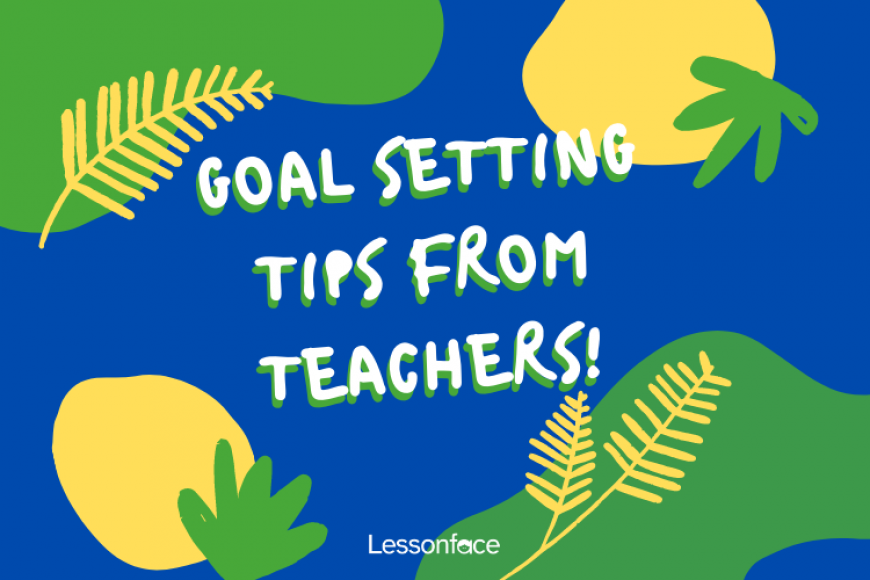
Happy New Year, students! We hope your 2023 is off to a terrific start and that you’ve got big plans for your musical, artistic, and academic passions this year. Lessonface teachers are experts in helping students reach their goals, and we’ve rounded up their best advice on how to follow through and achieve your resolutions.
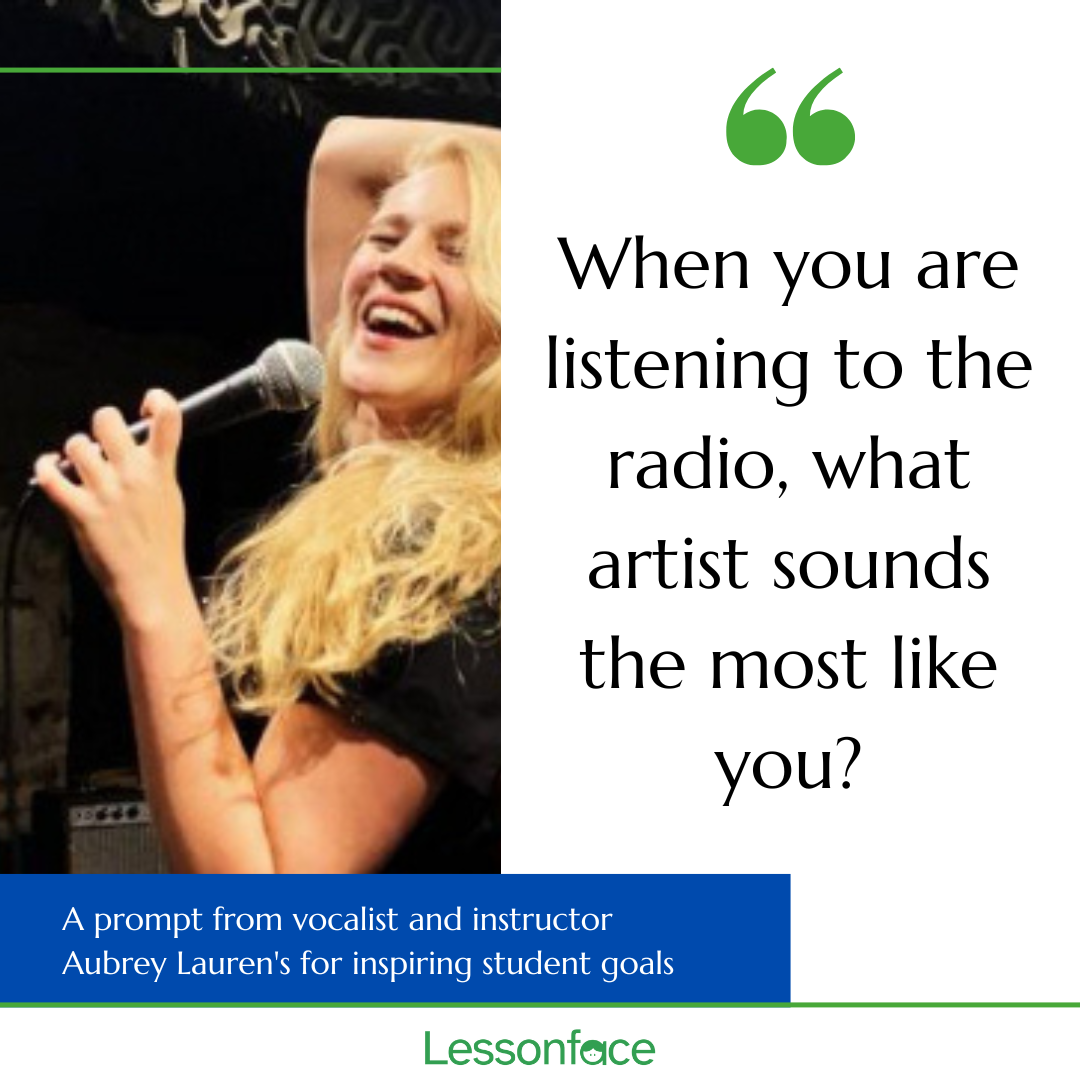
Think Big
Consider your long-term vision first. Guitar teacher Roque Deschamps asks his students to picture themselves in the future with their instrument. Aubrey Lauren asks her voice students, “When you are listening to the radio, what artist sounds the most like you?” This fun question gets students to consider qualities of their voice and the direction they would like to go as a singer.
A student of drum teacher Pierre Luc Lalonde started lessons with the long-term goal of joining the marching band at his future high school. Little by little, Pierre and his student worked on improving his playing. Two years later, the student has now joined the school’s marching band preparatory club.
Break It Down
Once you’ve got a clear idea of where you’d like to go with your instrument, work with your teacher to break your path into small segments. As guitar teacher Yoel Genin puts it, “Sometimes a goal seems so far and unachievable. But when you take it one little step at a time, and can see that full path you'll be walking to the finish line, it makes it easier, more achievable, and real.”
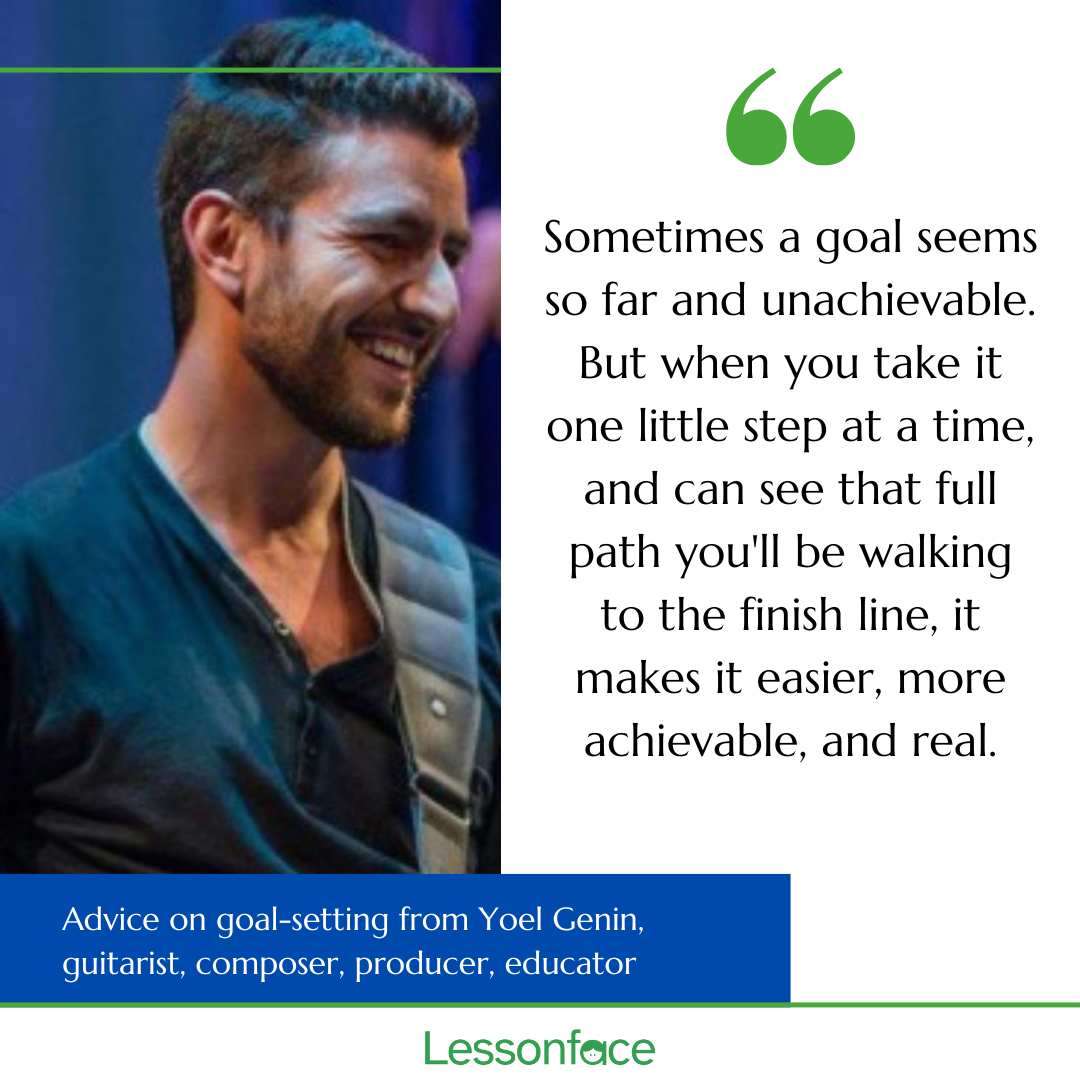
Months
Flute teacher Kate Hicks has students choose a song they’d like to play in three to six months. From there, they develop a practice routine and exercises that develop the skills needed to play the piece.
Voice and piano teacher Leah Hinton has her students write down three to five clear goals for the next six months. She recommends setting a mix of ambitious goals that will stretch your abilities and easier goals that are certainly achievable.
Weeks
Piano teacher Beverly Cashin finds that students need guidance in developing effective practice skills. After each lesson, she gives students a practice guide that outlines how to approach learning the song or scale or exercise.
Beverly and bass guitar teacher Bear Williams agree that when students complete their short-term goals and do their homework between classes, each lesson builds on the last and long-term progress is automatic.
Use Lessonface's goal-setting tool to guide you in setting goals and tracking your progress. You can share select goals with your teacher so that they know what you aim to accomplish. Knowing that your teacher will be expecting you to complete your weekly tasks is a great motivator. You can find the goal-setting app here or in your left-hand menu bar under the Profile heading.
Practice Sessions
Set goals for practice sessions that involve accomplishing objectives rather than practicing for a set amount of time. Multi-instrumentalist Alison Ervin suggests small, specific goals such as “mastering the fingering for a particular section, not missing any accidentals in a piece, or bumping up the tempo of a piece by 5 bpm.” Guitar teacher Tyson Farmer recommends choosing a definite number of repetitions for an exercise. That way “you're not constantly looking at the clock or just slacking off until your time is up… you're finished when you're finished regardless of how long or short it took to complete!”
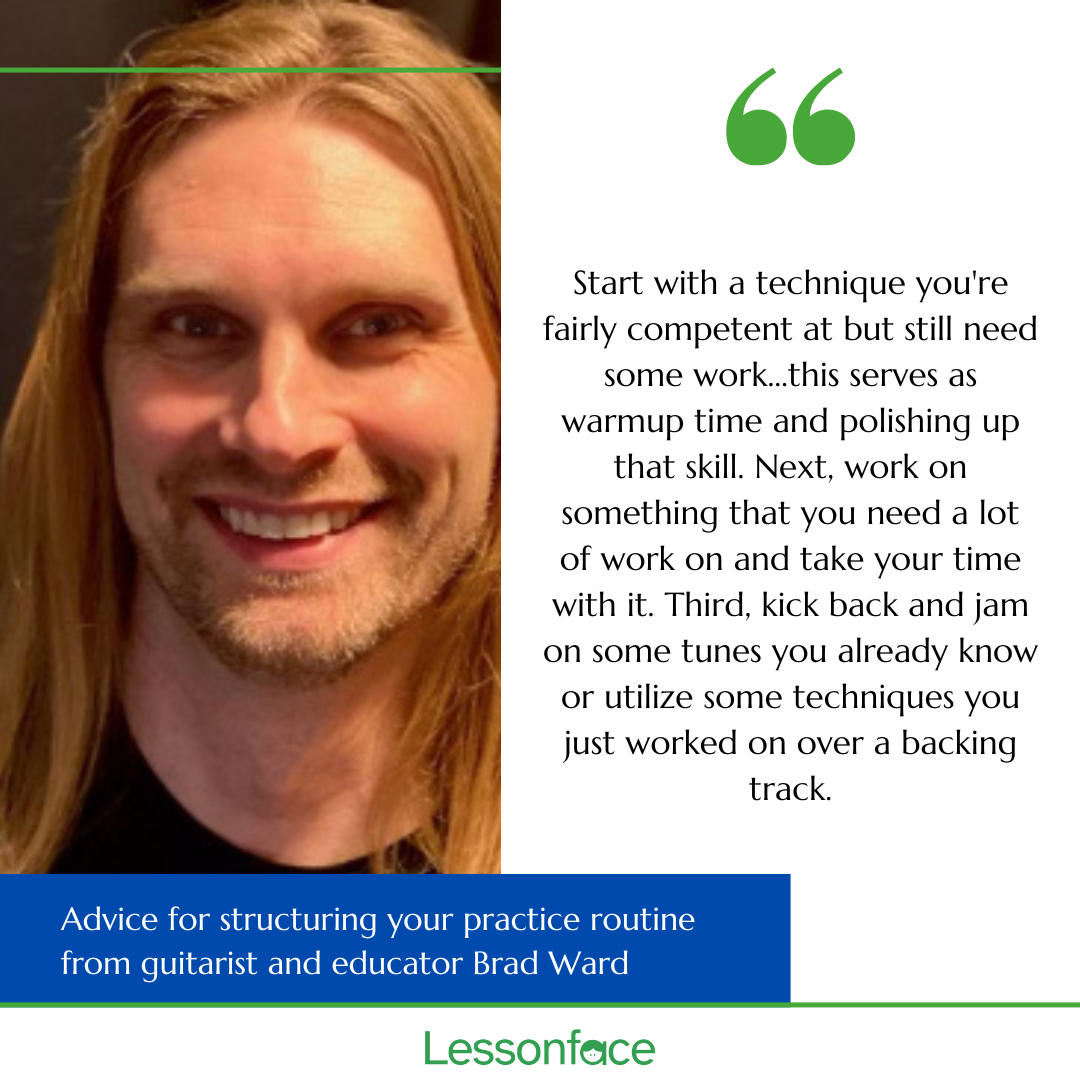
Guitar teacher Brad Ward recommends that students divide practice sessions into smaller parts to keep things interesting. “Start with a technique you're fairly competent at but still need some work…this serves as warmup time and polishing up that skill. Next, work on something that you need a lot of work on and take your time with it. Third, kick back and jam on some tunes you already know or utilize some techniques you just worked on over a backing track.”
For younger students, Tyson Farmer recommends micro rewards for completing small tasks within a practice session. For example, “one M&M (or other small treat) for every exercise repetition, or one minute of bonus video game time for every repetition.” This helps younger students bridge the gap between present work and future pay-off.
Assess and Adapt
Set your goals at the beginning of the year, but don’t file away the document and forget about it. Assess your progress with your teacher every few months. If a goal ends up being too difficult, adapt it to a simpler one. If your schedule has changed and you have less time to practice, adjust the time frame of your goals.
For young students, voice teacher Jenessa Logel emphasizes the importance of practice logs. She provides her students with a PDF to log the date, time and duration of when they practiced that week, plus a spot for their parents to sign off that they practiced. This helps hold students accountable and keeps parents in the loop. When practice goals aren’t being met, teacher, student, and parent can discuss how to prioritize practice, or, if appropriate, adjust the goals.
Voice teacher Amanda Austin encourages students of all ages to keep a journal. Dedicate one section to long-term goals for the year, quarter, and month. Use another section to articulate goals laid out in each lesson and log practice during the week. Journaling helps you assess your progress objectively. If you fall short of a goal, you can look back to see if it was due to lack of practice time, unexpected obstacles, or perhaps the goal being too lofty in the first place.
Lessonface offers free downloadable and printable practice log templates for children and a practice journal for adults to help jumpstart your journaling habit.
Collaborating with your teacher to assess and adjust your goals is vital to success and enjoyment in music. Working stubbornly on a goal that has turned out to be unrealistic is frustrating, discouraging, and unproductive. It’s always better to modify your objectives to make them achievable. Any progress is better than no progress, and you deserve to feel the excitement, confidence, and satisfaction that comes with accomplishing your goals.
Work Toward a Performance or Exam
Performances and other events motivate students with deadlines and specific requirements. Violin teacher Fiona Richards and piano and language teacher Donovan Kwan encourage students to participate in local recitals, Lessonface recitals and open mics, music festivals, and competitions. Fiona adds that making a video or audio recording can be just as beneficial as a performance event.
Donovan also advocates sitting for music exams such as those offered by the ABRSM (London), Trinity College of Music (London) or Rock School (London). Exams require students to work on specific pieces and areas of technique. Students who pass an exam receive an official music certification. The certificate may be useful for younger students considering careers in music, and they are satisfying trophies for students of all ages and ambitions.
Have Fun and Stay Positive
Trust in your ability to achieve the goals that you and your teacher have set. Piano teacher William Young explains, “If you say, ‘This is easy!’, your mind speeds up and makes it easy. If you say, ‘This is hard!", your mind believes you,” and it is indeed hard.
Be kind to yourself when you experience a setback, and celebrate even your smallest successes. Guitar teacher Jason Fawks reminds his students, “it’s not about perfection, but heading in the right direction!” Jazz teacher and multi-instrumentalist Thomas Mackay explains “It is important for the student to have fun with each lesson and feel a sense of accomplishment even if it’s the smallest improvement.”
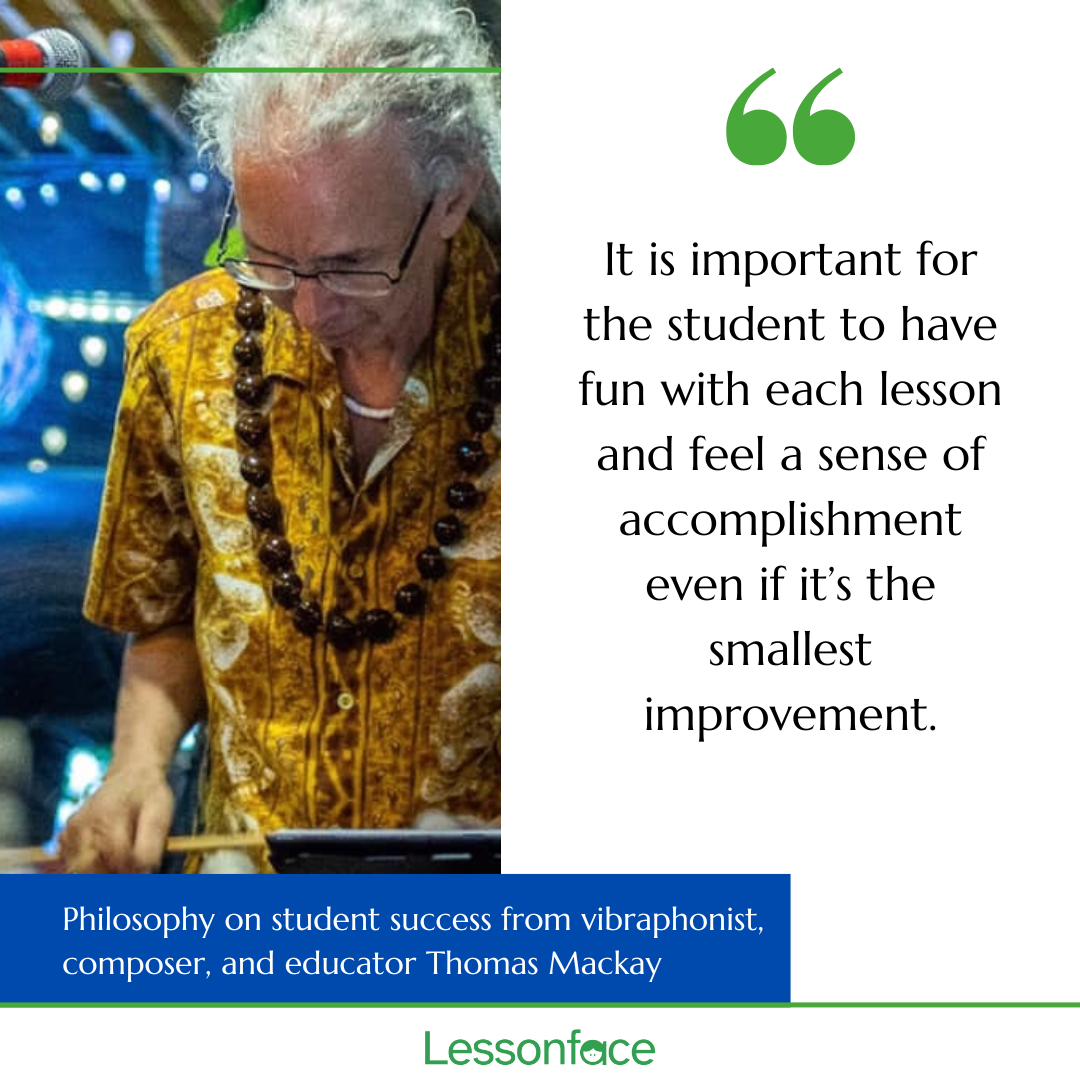
Fiona Richards advises trying something new any time you feel in a rut with your playing. For example, try out improvising, or think of a story to go with a piece you are playing.
Tyson Farmer recommends playing along with songs you’re learning as a fun and rewarding way to spice up your practice. If a recording is too fast to keep up with, find the song on YouTube and adjust the playback speed. Go to the gear icon, click "Playback Speed", and slow down the song to a manageable tempo. Use the "Custom" option to fine tune the speed on desktop computers.
Leah Hinton emphasizes keeping a positive, grateful attitude when assessing what you’ve achieved. Don’t just set your goals, check them off, and set new ones. Think back over the past several months and reflect on all the ways you’ve grown as a person and artist. Give yourself time to feel satisfied and grateful for what you’ve already accomplished. That confidence will fuel both your enjoyment and your future success as a musician.




